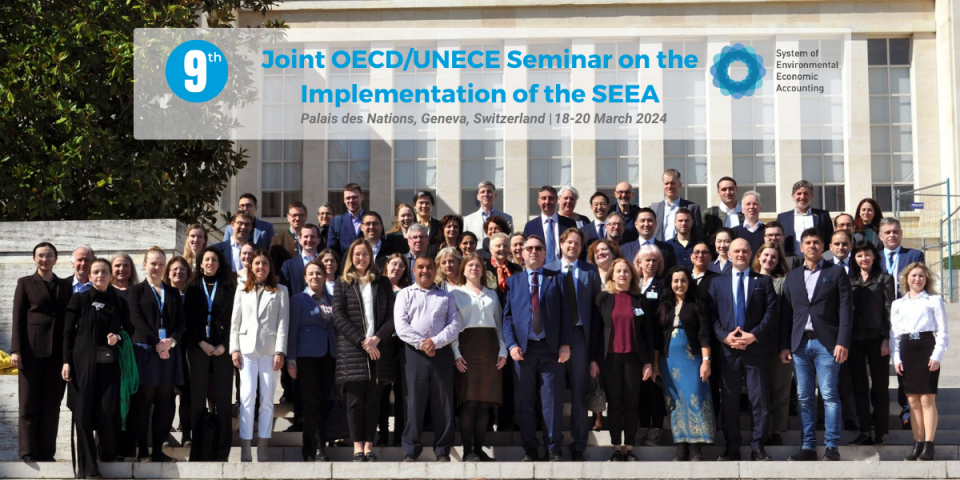Ninth Joint OECD/UNECE Seminar on the Implementation of the SEEA

The 9th Joint OECD/UNECE Seminar on the Implementation of the System of Environmental-Economic Accounting (SEEA) was held at the Palais des Nations in Geneva, Switzerland, from 18-20 March 2024. The seminar series is organized regularly with a long-term view to support the implementation of the SEEA.
Members of the Organising Committee included the National Statistical Offices of Australia, Estonia, Finland (chair), Germany, the Netherlands, Sweden, and the United States in addition to Eurostat, IMF, UNEP, UNSD, OECD and UNECE.
The meeting brought together more than 90 experts in person representing 37 countries, several international organisations, academia and NGOs. In addition, web streaming of the seminar counted more than 200 views.
The seminar was opened by Ms. Tiina Luige, Director of UNECE Statistical Division, and Mr. Bram Edens on behalf of Mr. Paul Schreyer, Director of OECD Statistics and Data Directorate. The seminar consisted of two main sessions which focused on utilizing the SEEA for measuring circular economy and informing climate-change adaptation and response policies with SEEA. Sub-sessions were dedicated to the topics on:
- Waste accounts for measuring circularity
- The "circular economy sector”: new developments and utilizing Environmental Goods and Services Sector Accounts (EGSS) for measuring jobs, good and services related to circular economy.
- Measuring flows of biomass and bio-based material in a circular economy
- Utilizing SEEA for measuring physical flows of plastics.
- Climate change expenditures
- Measuring ecosystem condition, degradation and loss of ecosystem services
Presenters and participants discussed actively the usefulness and limitations of related SEEA accounts for measuring circular economy and climate change adaptation, including disaster risk management. Moreover, many sub-sessions touched upon implications for the planned update of SEEA Central Framework, which was endorsed by the UN Statistical Commission in March 2024, as well as recent updates and possible inputs for the relevant classification systems, such as the Classification of Environmental Purposes (CEP) adopted by the UNSC in March 2024 and the planned revision of the Classification of Functions of Government (COFOG).
Each main session was wrapped up by a panel discussion, where panelists discussed among others importance of making full use of existing data in parallel to further developing related classification systems and methodologies, clear communication to policy makers and connecting with different communities.
Prior to the formal opening of the seminar, participants had informal discussions at the World Café where representatives of ESCAP, European Commission, OECD, UNECE, UNCTAD and University of Exeter updated participants on their recent work relevant to the implementation of SEEA. Key points from the World Café were shared at the concluding session.
Participants of the seminar agreed to organize another meeting in a year. UNECE and OECD will soon inform about the exact dates of the next seminar.
All documents of the seminar can be found on the Seminar’s webpage https://unece.org/info/Statistics/events/383686. Also, recordings of the meeting are available on YouTube https://www.youtube.com/playlist?list=PLe6uBaBVebZBdlSSxSa7CkJ7KOMAMi7dV.
Article contributed by UNECE and OECD
Photo UNECE Stats
